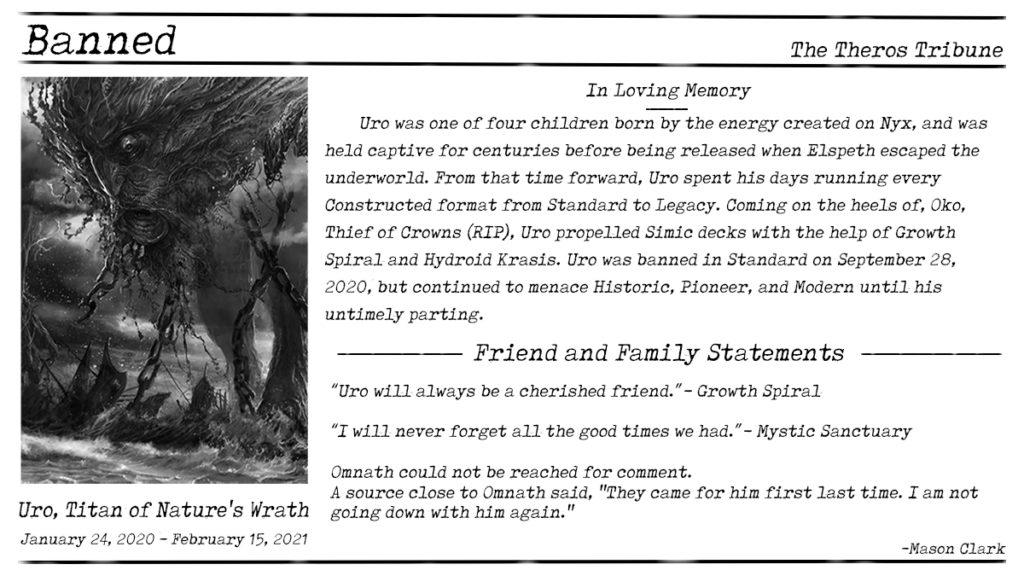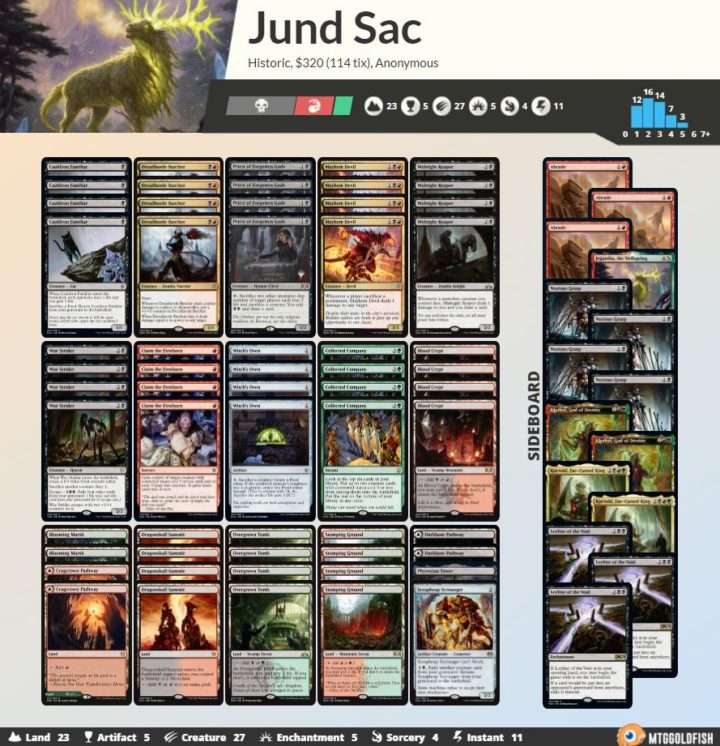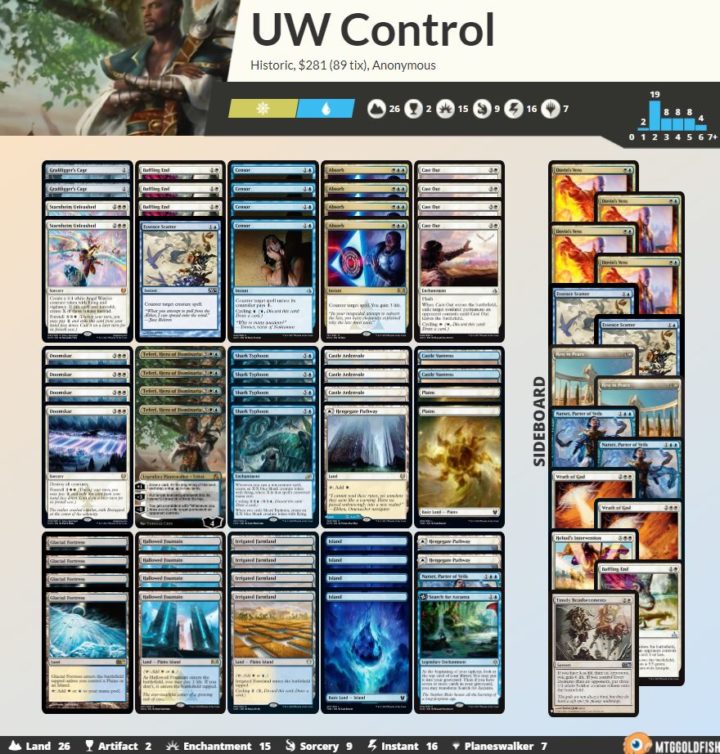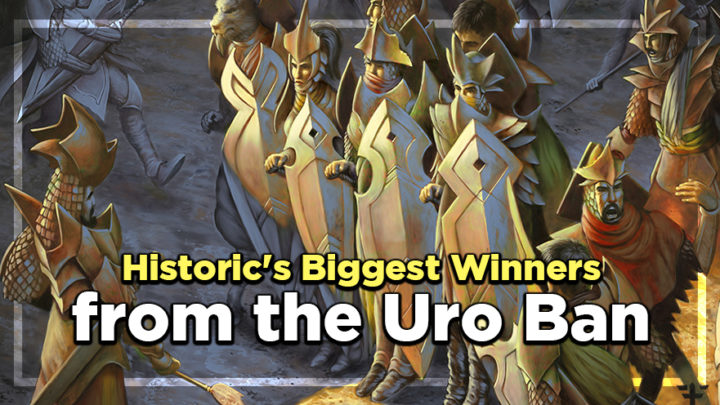
This past Monday, the largest ban announcement in months threatened to shake up Magic’s non-rotating formats. Uro, Titan of Nature’s Wrath was banned in Historic, Pioneer, and Modern — along with a long list of other cards in Pioneer, Modern, and Legacy. Eternal formats as you knew them are completely different, and everyone is eagerly trying out new strategies and brewing. We’re going to focus on Historic today, but eternal formats will be thrown for a loop in the following weeks.
Sultai and Four-Color Midrange have been popular archetypes in Historic for months, shutting out many other strategies from the format entirely. Uro was key to the success of both of these decks, and the ban largely takes them out of tier one contention in Historic. While there are a couple of replacements for Uro in these decks like Explore or Cultivate, I would rather look at different archetypes moving forward in Historic.
The Uro ban was a great move for shaking up Historic and promoting format health, but was it enough? A big concern among avid Historic players is that Goblins and Sacrifice are going to take over the format because neither deck lost any key pieces in the bans. I’m personally glad nothing was banned or suspended from any Sacrifice decks, but I am shocked after the overall success of Sacrifice decks at the Zendikar Rising Championship and the first weekend of the Rivals/MPL Split.
So, are Goblins and Sacrifice going to take over Historic? Were there enough bans in Historic? Who are the biggest winners from the Uro ban? There are a lot of questions to think about in the following weeks when diving into the new Historic format, but I think there are a few clear winners here.
Jund Sacrifice
The obvious winner with the Uro ban is Jund Sacrifice. Jund and Rakdos Sacrifice were both at the top of the metagame, even before Uro was banned. The only other deck at the top of the heap was Goblins, but Sacrifice decks have such a good match-up against Goblins that we may see Muxus and co. pushed to the side for a while. Sacrifice is one of the most powerful and consistent things you can be doing in Historic right now, and banning Uro doesn’t necessarily open up any archetypes that can beat Sacrifice.
Without Uro, aggressive strategies are likely going to spring up into tier two. However, these decks often lose to Sacrifice due to lifegain from Cauldron Familiar and Witch’s Oven, as well as Mayhem Devil and Priest of Forgotten Gods’ ability to control the board. Overall, Sacrifice feels like the most inherently powerful thing in the format right now — you can win through graveyard hate with Abrade or Reclamation Sage, and you have Noxious Grasp to deal with Yasharn. You also have Korvold as a plan B out of Jund Sacrifice.
That brings us to the big question: should you play Jund or Rakdos Sacrifice? Typically, I prefer Rakdos Sacrifice against a diverse metagame because of its improved consistency and stronger mana base. However, after the format settles down, I expect more players to gravitate to Jund Sacrifice, and I do not want to be playing Rakdos Sacrifice in that head-to-head. You can stay pretty even in the match-up, but Collected Company and Korvold are hard to outpace or catch up to when you’re behind. I would much rather be playing a Jund Sacrifice mirror and tuning my sideboard to hedge for the mirror.
On my stream this week, I took this Jund Sacrifice list all the way to #10 on the ranked ladder.

Azorius Control
While you probably aren’t surprised that I’m recommending a Sacrifice deck in this article, you might not have expected my next recommendation.

That’s right, Azorius Control. Back when Uro was in the format, it was hard to justify playing this deck for a few reasons. First, it was more effective to splash green in your Azorius deck to play Uro, as well as cards like Growth Spiral and Yasharn. Bant Control almost completely overtook Azorius Control as an archetype because the green cards provided card advantage and a higher power level. Secondly, Azorius Control often could not keep up with Uro players’ mana ramp and card advantage. It’s hard for Azorius Control to run a Sultai Midrange player out of cards or even counter multiple spells a turn with half the amount of mana as the opponent.
With Uro out of the picture, there are few reasons not to play Azorius Control, and the deck certainly has its strengths, too. Azorius Control is one of the only decks that actively benefits from running the most effective hate card in Historic in the main deck: Grafdigger’s Cage. Cage is one of the best cards against Sacrifice, Goblins, Auras, and other Collected Company decks. Often, having this card in the main deck can help Azorius Control win games they wouldn’t have won otherwise.
Additionally, there have been great additions to this archetype in Kaldheim. Doomskar is one of the most impressive cards to be added to Azorius Control in a while. Often, these control decks roll over to fast, aggressive strategies, and a turn four board wipe just isn’t good enough. I have had no issue casting Doomskar for its foretell cost on turn three when necessary.
You’ve probably heard me talk about Starnheim Unleashed before, and I still think it’s the most underrated card in Kaldheim. This card has overperformed in every deck I have put it in, and it is especially useful in Azorius Control as an extra wincon or a way to combat small creature decks.
Thanks to both these cards, I took the Azorius Control list above on a 14-1 streak to hit #13 on the ranked ladder.
***
Overall, I don’t think the metagame changes a lot with only an Uro ban. I love Sacrifice decks and would prefer not to see any cards from the deck banned, but I think it will be hard to find a way to successfully combat it in the current metagame. Historic Anthology 4 has been announced for the future, and I hope that can shake up Historic in an exciting and healthy way. Until then, I recommend playing Jund Sacrifice or Azorius Control, as both are very powerful and will bring you success in the current metagame.

Ally Warfield is a member of the Rivals League, a full-time streamer, and a Splinter Twin apologist. Her focus is in Historic and Standard, but she also loves to dabble in Vintage and Limited formats as well.

